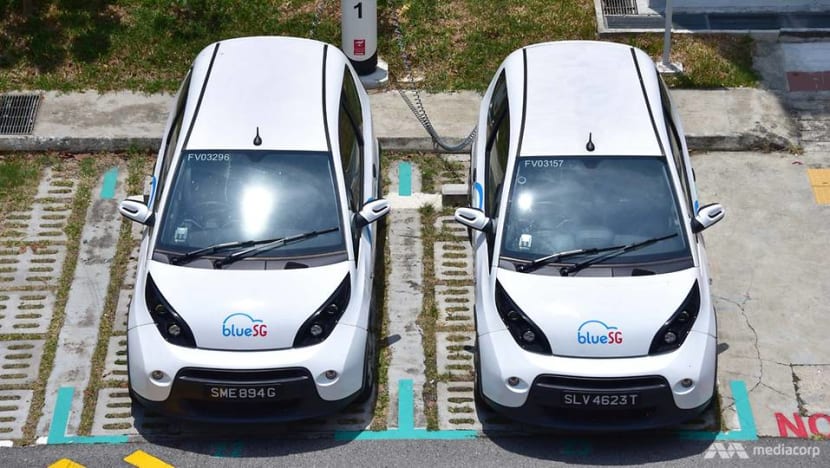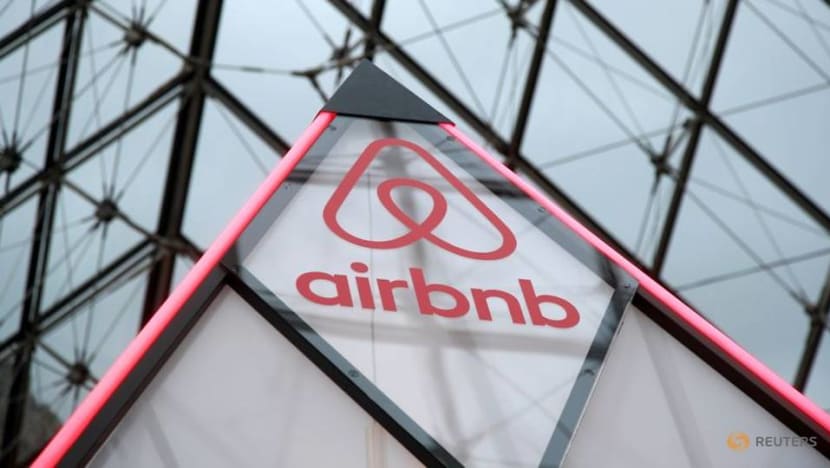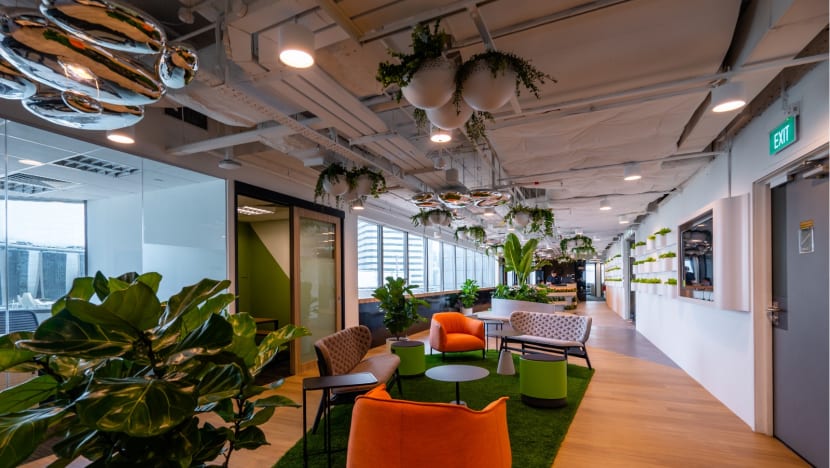commentary Commentary
Commentary: Don’t be too quick to write off the sharing economy, even with COVID-19
Lockdowns and concerns over safety initially affected businesses in the sharing economy, but they have since re-aligned their priorities, says SUSS’ Dr Wang Yue.

Electric cars operated by car-sharing service BlueSG in Singapore. (File photo: Gaya Chandramohan)
SINGAPORE: The sharing economy creates value by making good use of idle and existing resources.
For example, Airbnb makes unused private houses available for short-term stays, while Uber and Grab make underused private cars available to the public for transportation.
This model has been helping the resource owners reap profits while reducing the cost to consumers or plugging a service gap that was previously missing.
Until Uber came along, for instance, most of us had to hail cabs off the street or wait on the phone to book a taxi. Uber allowed us the comfort of doing so seamlessly through its app.
HOW THE PANDEMIC CHANGED THINGS
But the pandemic’s impact on businesses involving face-to-face interactions was devastating. Many in the sharing economy were casualties.
Because of travel restrictions, lockdowns, circuit breakers and various containment measures, regular consumption habits were severely disrupted.
Since everyone had to stay home, they hardly took taxis, travelled overseas or went to the office.
READ: Commentary: Is Airbnb’s IPO listing this week worth your investment?
Like many other travel-associated companies, Airbnb suffered as the demand for short-term lease of its apartments fell without travel.
Its CEO Brian Chesky said in June: “(In March), we spent 12 years building our business, and within six weeks lost about 80 per cent of it.”
Industries like ride-sharing or car-sharing were presented a double whammy: Along with passengers commuting less, some were also concerned about being in a car that may have carried an infected passenger or driver.

“Based on our analysis of the gig economy and the overall pie of consumers, unfortunately, there’s a slice that — until there’s a vaccine — will not get in a ride-sharing vehicle or use an Airbnb,” Daniel Ives, managing director of equity research at Wedbush Securities in the US, was quoted in a New York Times article last May.
Local ride-sharing company Grab’s CEO Anthony Tan told media in April that in some countries its “transport GMV (gross merchandise value) is down by double-digit percentage”. In June, the company announced a cut of 5 per cent of its headcount after it also reduced incentives for its drivers.
IT WASN’T ALL DOOM AND GLOOM
Such developments prompted observers to proclaim the sharing economy dead. That was premature, though industry players needed to act quickly to rescue themselves from the dire situation.
In the short term, and as soon as some mobility of people and services resumed within countries, sharing economy firms implemented measures to reassure consumers their services are perfectly safe.
READ: Commentary: The next tech crash is around the corner thanks to COVID-19
READ: Commentary: China’s delivery apps are putting riders at risk
For instance, a mask verification technology was built into Uber’s app to ensure drivers wear a mask before they start to drive passengers or deliver food. Airbnb introduced 24-hour vacancies between bookings as part of new cleaning protocols.
But for the longer term, companies in the sharing economy need to rethink its business operations.
After all, the sharing economy was already facing challenges even before the pandemic hit as achieving profitability was harder than predicted.
For instance, Uber lost US$8.5 billion in 2019. Although Airbnb’s revenue jumped 32 per cent in 2019, it still reported a net loss of US$674 million the same year due to increased marketing spending, adding technology and expanding its programmes.
DEEPER CHANGES WERE NECESSARY
These were signs that changes needed to be made and the pandemic-led slowdown provided the opportunity to take a step back and review the business.

However, given the different nature of the various industries even within the sharing economy, some companies chose to focus on their core business to recover from the pandemic-driven slump while others diversified to increase revenue sources.
For instance, Airbnb paused its efforts in transportation, reduced investment in hotels and Airbnb Luxe (for luxury travel), and focused on its core business, which is renting out private homes.
Drawing from Airbnb’s data from about 200 countries, Mr Chesky predicted that leisure travel will resume before business travel, as businesses can operate with video conferencing, but people need to reconnect with family and friends, and to have different experiences.
He also predicted that people will choose to stay in nearby small communities instead of urban city centres or overseas destinations, and the rental period will be longer, perhaps monthly.
Airbnb thus changed its focus to market domestic reservations and nearby stays within 200 miles.
Although Airbnb went through the toughest year, its IPO and stock market debut on Dec 10 was a good sign of its business recovery and market confidence. Its recovery has been faster than that of traditional hotel and travel businesses.
Grab, on the other hand, focused on its non-core business.
Although its transport business suffered during the circuit breaker, the pandemic created a golden opportunity for Grab’s food-delivery segment.
READ: Commentary: Impact of Grab-Gojek merger on consumers and drivers unlikely to be huge
GrabFood grew fast and now accounts for more than 50 per cent of Grab’s revenue, with 150,000 of its drivers switching to becoming delivery men.
This trend may prompt observers to conclude that the company could increasingly rely on its food-delivery business to drive growth.
However, we shouldn’t write off its core ride-hailing business.
It was reported that Grab’s earnings bounced back to pre-COVID numbers in October, in part because some wary commuters find it less risky to travel by ride-hailing cabs than on the MRT trains and buses during peak-hour traffic. Such trends reflect the resilience of the sharing economy.
SHARING ECONOMY PRINCIPLES HERE TO STAY
Other businesses have also adopted sharing economy concepts to better utilise idle resources.
An example in Singapore included office space provider O2Work, which took advantage of low prices of central commercial rental and expanded its business to offer co-working spaces.

The company believed in the market’s need for working together instead of working in isolation from home, as well as a long-term flexible working arrangement and companies’ needs to downgrade from renting a whole office to sharing space to reduce operating costs.
Despite the pandemic, sharing economy principles are here to stay.
For one, the economic fallout brought about by COVID-19 may leave consumers more cost-conscious. More affordable choices offered by the sharing economy could be attractive for consumers. For instance, some consumers could shift from car ownership to renting cars from Gojek or BlueSG.
From a business perspective, COVID-19 could reduce the number of competitors for companies in the sharing economy. For example, many hotels may not survive the decline in travel and tourism during the pandemic. However, an asset-light Airbnb may be better able to do so.
Thus, the company could have less competition to deal with going forward and have greater market share.
READ: Commentary: We got to know Grab for its transport business. That will soon change
The pandemic has provided companies a good chance to re-examine the value of their businesses, who their core customers are, what the real needs are and where the growth opportunities are.
Firms need to stay vigilant of what’s happening to discover new consumption patterns and opportunities.
This has not been different for the sharing economy players, which initially suffered a setback to their operations and revenues but have bounced back by re-aligning themselves and recalibrating their strategies.
With new green targets announced by the Singapore Government, will we be seeing more electric vehicles on our roads in the near future? An energy expert and a business professor weigh in:
Dr Wang Yue is Head of Doctor of Business Administration Programme at the School of Business, Singapore University of Social Sciences. Her research interests include digital marketing and social media trends.












